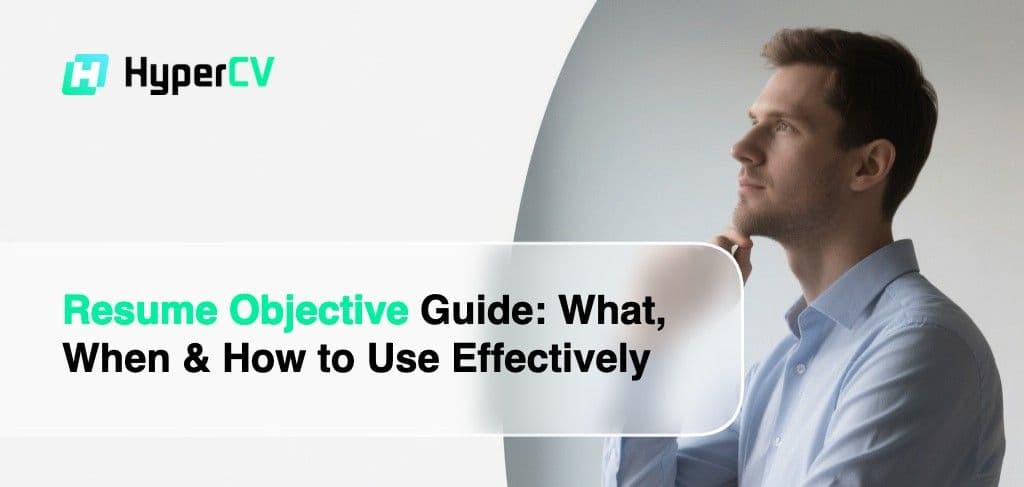Resume Objective Guide: What, When & How to Use Effectively

Your resume objective tells employers who you are and what you want in just one or two sentences. It's your chance to make a strong first impression before they read the rest of your resume. Think of it as your elevator pitch on paper.
Writing a good resume objective can help you stand out from other job seekers. But knowing what and when and how to use resume objective statements isn't always clear. Some people use them wrong, while others skip them when they could actually help.
In this guide, we'll break down everything you need to know about resume objectives. You'll learn when they work best, how to write them, and see real examples you can adapt for your own job search.
What is a Resume Objective?
A resume objective is a brief statement at the top of your resume. It explains your career goals and why you want a specific job. Most objectives are one to two sentences long and focus on what you can offer an employer.
Unlike a resume summary that highlights your past achievements, an objective looks forward to what you want to accomplish. It's especially useful when you're starting your career, changing fields, or have gaps in your work history.
Think of your objective as answering three key questions:
- Who are you professionally?
- What kind of role do you want?
- What value can you bring to the company?
The best objectives are specific to each job you apply for. This means you'll need to customize yours for different positions, but the extra effort often pays off with more interview requests. According to Resumeble's guide, tailoring your objective to specific companies and job openings is crucial for making a strong first impression.
When Should You Use a Resume Objective?
Not every resume needs an objective. Here are the main situations where adding one makes sense:
Starting Your Career
If you're new to the workforce, an objective helps explain your goals and potential. You might not have much work experience, but you can highlight your education, skills, and enthusiasm for the field.
For example, a recent college graduate might write: "Marketing graduate seeking an entry-level position to apply digital marketing skills and help growing companies reach new customers."
Changing Career Paths
Career changes can confuse employers who see experience in one field but applications for another. Your objective can bridge this gap by explaining the change and highlighting transferable skills.
A teacher moving to corporate training might write: "Experienced educator transitioning to corporate training to help organizations develop their teams using proven teaching methods and curriculum design skills."For more strategies on making successful career transitions, including how to address this change in your cover letter, check our guide on cover letter and resume differences.
Highlighting Your Specialty
In competitive fields, an objective can emphasize your specific expertise. This works especially well when you have a unique skill set or serve a particular market.
For instance: "Digital marketer specializing in e-commerce growth strategies, with experience increasing online sales by 150% for small businesses."
Explaining Location Changes
When you're moving to a new city or state, employers might wonder about your commitment to the area. An objective can address this concern directly.
Addressing Resume Gaps
If you have gaps in your employment history, an objective gives you space to briefly explain them. This is particularly helpful if the gap was for education, family care, or health reasons.
According to Jobscan's comprehensive guide, objectives are particularly useful for recent graduates or those changing careers, as they help explain your career direction when your experience might not clearly show it.
How to Write an Effective Resume Objective

Keep It Short and Focused
Your objective should be no more than two sentences. Hiring managers spend just seconds scanning each resume, so get to the point quickly. Avoid unnecessary words and focus on your main message.
Instead of: "I am a highly motivated individual seeking a challenging position where I can utilize my skills" Try: "Sales professional with 3 years of experience seeking a regional sales role to drive revenue growth"
Customize for Each Job
Generic objectives don't work well. Read each job posting carefully and adjust your objective to match what the employer wants. Use similar language and highlight relevant skills.
If a job posting emphasizes teamwork, mention your collaboration skills. If they want someone with specific software experience, include that in your objective. Indeed's guide emphasizes that a well-written resume objective should be customized to the job for which you're applying and help set you apart from other applicants.
Start with Your Biggest Strength
Lead with your most impressive qualification or achievement. This could be years of experience, a relevant degree, or a major accomplishment.
Examples:
- "Certified project manager with 8 years of experience..."
- "Recent engineering graduate with internship experience at Fortune 500 companies..."
- "Sales representative who exceeded targets by 40% for two consecutive years..."
Show Your Value
Employers want to know what you can do for them. Instead of just stating what you want, explain what you bring to the table. Focus on benefits to the employer, not just your career goals.
Weak: "Seeking a marketing position to advance my career" Strong: "Digital marketing specialist seeking to increase brand awareness and customer engagement for a growing tech company"
Use Action Words
Start your objective with strong action verbs that show confidence and capability. Words like "seeking," "aiming," or "pursuing" work well for objectives.
Other good options include:
- Leveraging
- Applying
- Contributing
- Utilizing
- Bringing
Common Resume Objective Examples by Industry
Entry-Level Positions
| Job Type | Example Objective |
|---|---|
| Customer Service | "Recent business graduate seeking customer service role to apply communication skills and help create positive customer experiences" |
| Administrative Assistant | "Organized professional with strong computer skills seeking administrative position to support team efficiency and office operations" |
| Sales Associate | "Enthusiastic individual with retail experience seeking sales position to help customers find products and exceed sales targets" |
Career Change Objectives
Teacher to Corporate Trainer: "Experienced educator with 5 years of classroom management seeking corporate training role to develop employee skills using proven instructional design methods"
Military to Civilian: "Former military logistics coordinator transitioning to supply chain management to apply organizational skills and attention to detail in civilian operations"
Healthcare to Administration: "Healthcare professional with patient coordination experience seeking administrative role to utilize organizational skills and medical knowledge in office management"
Specialized Roles
IT Professional: "Network administrator with cybersecurity certification seeking to protect company data and maintain system reliability for growing technology firm"
Nursing: "Registered nurse with emergency room experience seeking intensive care position to provide compassionate patient care in high-pressure environments"
Engineering: "Mechanical engineer with 3 years of product design experience seeking senior role to lead innovative projects and mentor junior team members"
What to Avoid in Resume Objectives
Being Too Vague
Avoid generic statements that could apply to any job. Phrases like "seeking a challenging position" or "looking for growth opportunities" don't tell employers anything useful about you.
Focusing Only on Yourself
While objectives are about your goals, they should also show value to employers. Don't just list what you want without explaining what you offer.
Making It Too Long
Long objectives lose impact and take up valuable resume space. If you can't say it in two sentences, consider using a resume summary instead.
Using Outdated Language
Avoid formal, outdated phrases like "To obtain a position" or "References available upon request." Modern objectives sound more natural and conversational.
Including Obvious Information
Don't waste space on things that are already clear from your resume. For example, don't say you're "seeking full-time employment" unless you're specifically looking for part-time work.
As noted in Resume Genius's comprehensive guide, which includes over 120 examples, effective objectives should be brief statements of your qualifications and career goals that are tailored to specific jobs.
Resume Objective vs. Resume Summary
Many people confuse objectives with summaries, but they serve different purposes. If you're unsure which approach works best for your situation, our complete guide to resume summaries can help you decide.
Resume Objective:
- Forward-looking
- States career goals
- Best for career changers and new graduates
- Focuses on what you want to achieve
Resume Summary:
- Backward-looking
- Highlights past achievements
- Best for experienced professionals
- Focuses on what you've already accomplished
Choose an objective when you're starting out, changing careers, or have unique circumstances to explain. Use a summary when you have solid experience in your field and want to highlight your achievements.

Tips for Different Career Stages
Recent Graduates
Emphasize your education, internships, and relevant coursework. Show enthusiasm for the field and willingness to learn.
"Recent marketing graduate with internship experience in social media management seeking entry-level position to help brands connect with young audiences"
Mid-Career Professionals
Highlight your experience and specific skills. Show how you can solve problems for the employer.
"Project manager with 7 years of experience in software development seeking senior role to lead cross-functional teams and deliver complex projects on time"
Career Changers
Connect your past experience to your new field. Emphasize transferable skills and explain your motivation for the change.
"Former retail manager with customer service expertise transitioning to human resources to help companies build positive workplace cultures"
Making Your Objective Stand Out
Include Numbers When Possible
Quantifying your achievements makes them more credible and impressive. Use specific numbers, percentages, or dollar amounts when relevant.
"Sales professional who increased territory revenue by 25% seeking regional manager role to scale successful strategies across larger markets"
Mention Relevant Certifications
If you have certifications that matter for the job, include them in your objective. This immediately shows you're qualified.
"PMP-certified project manager seeking senior role to apply agile methodologies and drive digital transformation initiatives"
Show Industry Knowledge
Demonstrate that you understand the field and current trends. This shows you're serious about the industry.
"Digital marketer experienced in AI-powered customer segmentation seeking to help e-commerce companies personalize customer experiences"
Final Thoughts on Resume Objectives
A well-written resume objective can open doors to job interviews and career opportunities. The key is knowing when to use one and how to write it effectively.
Remember that your objective is just the beginning of your resume. It should work together with your experience, skills, and education to tell a complete story about who you are as a professional.
Take time to craft objectives that are specific, valuable, and relevant to each job you apply for. While it requires extra effort, this personalized approach often leads to better results in your job search.
Whether you're starting your career, making a change, or looking to advance, a strong objective can help you communicate your value to potential employers and land the job you want.To see how your objective fits into a complete application strategy, explore our professional resume templates designed for different industries and experience levels.